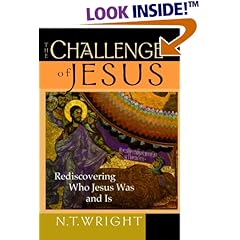 I couldn't get to sleep last night, so I decided to finish reading N.T. Wright's The Challenge of Jesus: Rediscovering Who Jesus Was and Is. (I finished at about 1:00am). I started reading this book during my breaktimes while I was working third shift at Rockwell; so, it has taken me a while to finish. (It was really difficult to concentrate on reading and thinking critically at 4:00am!)
I couldn't get to sleep last night, so I decided to finish reading N.T. Wright's The Challenge of Jesus: Rediscovering Who Jesus Was and Is. (I finished at about 1:00am). I started reading this book during my breaktimes while I was working third shift at Rockwell; so, it has taken me a while to finish. (It was really difficult to concentrate on reading and thinking critically at 4:00am!)As usual, Wright's book was both scholarly and pastoral in nature. Wright writes with the goal of having each reader grow in his or her understanding of the historical Jesus (one that is firmly planted within the first century Palestinian world) and to follow Him more faithfully in the twenty-first century.
Although I found many helpful discussions in this book (namely, Wright's discussion involving the way Jesus subverted the Jewish symbols in order to show Himself to be the true Israel, the true Temple where forgiveness and hope is found.) Yet, Wright's book is not without serious flaws. As one Amazon reviewer wrote,
one of these [flaws] is particularly serious, namely inadequate handling of the Atonement. Nowhere in the book's climactic chapter, `The Challenge of Easter' does Wright come close to explaining how Jesus' death can be the means of salvation or even transference of guilt. In fairness to the author, it is clear from passing comments elsewhere in the book that he vehemently disowns the view that Calvary was no more than an example to the infant church of the cross-bearing path it would have to follow. Nevertheless, he does not elaborate this conviction in the parts of the book where it matters most, and readers could be excused for inferring from the chapter under discussion that Jesus' painful death was little more than an inconvenient bridge he had to cross to get to his glorious resurrection.
The under-emphasis of substitutionary atonement was for me at least the most serious of several flaws including a rather too guarded analysis by the author of exactly what he means when he speaks of Christ's divinity, and in a lesser work these might have been fatal. But it really is too much to expect that any one book but the Bible itself can do justice to every strand of Christian truth.

No comments:
Post a Comment